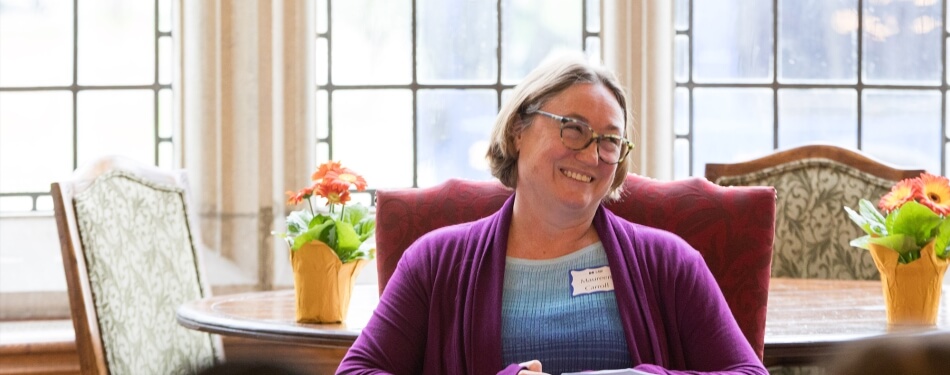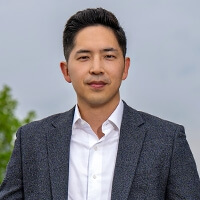The Blue Jeans Lecture, in which the winner of the L. Hart Wright Award for Excellence in Teaching offers life advice on practicing law and beyond, recently returned from its pandemic-induced hiatus. Professor Maureen Carroll reminded the Michigan Law community that changes in what we bring to the table don’t diminish the worth of our contribution, a lesson she has learned since receiving the L. Hart Wright Award in 2022.
“You might have noticed it was the 2022 teaching award that I won, and you may be thinking, ‘It’s fall 2023,’” said Carroll. “‘What happened in between?’”
Last October, Carroll was diagnosed with COVID-19 and is still in recovery, dealing with what is now known as long COVID. The condition can present various symptoms that disrupt daily living. As a result, she had to step away from many of the things she had expected to be doing, which included postponing the delivery of her Blue Jeans Lecture to this year.
Early in Carroll’s lecture, she quoted an adage her wife, Emily, often says: Don’t compare your insides to other people’s outsides.
“It’s not easy to be a person in the world. It’s not easy to be a woman in the world. It’s not easy to be a queer woman in the world,” said Carroll. “There are many things that make all of our lives not easy, and I do mean all of us. It’s tempting to think that other people have it all figured out, and to focus on [those parts of ourselves that we’re] worried about instead of what we bring to the table.”
Carroll explained that being sick for the past year has posed many challenges, including what it looks like to play with her two small children. She has had to explain to them that, on certain days, giving piggyback rides and playing tag isn’t an option. But, in communicating her health needs, the response she’s received has been surprising.
“If you recognize that you don't know the whole story, it can make the world an easier place to live in.”
“Kids are so resilient; they’re so much more resilient than it’s easy to give them credit for,” said Carroll. “My older daughter will say, ‘Okay, I want to play this game, and you can sit here so you don’t have to stand up or move.’ I like to think she’s learning from me how to have a good relationship with someone who is different in their mobility and the way they do things physically.”
Cutting back her teaching schedule has also challenged Carroll, whose ardent dedication to the Michigan Law community and campus earned her last year’s award.
“I am doing things more slowly than I otherwise would,” she said. “I’m reminding myself that being able to do less doesn’t mean I’m worthless. I’m still bringing things to the table; I’m still doing what I can, even if those things are different than they used to be.”
She considers this past year a lesson in adaptation, but her pursuit to understand people more deeply began before she became sick. She shared with the audience several examples of her exploration toward empathy, including when Prop 8 was on the ballot in California—a 2008 constitutional amendment intended to ban same-sex marriage in the state. She was in law school at UCLA and knew people who would likely vote for the proposition, so she asked to have conversations with them to better understand their reasoning.
One couple she spoke with were members of a church whose leader instructed them to vote for Prop 8. The couple didn’t want to go against the church but disagreed with voting against LGBTQ rights. In the end, they chose not to vote at all.
“It was enlightening to see how torn they were, how difficult it was for them, how hard they were working to do the right thing,” said Carroll. “It didn’t make the outcome of the vote better, but it did change the impact on me emotionally—I would’ve never known if I hadn’t had that conversation.”
She emphasized that understanding people’s reasoning is not the same as stepping in the line of fire for their choices.
“It comes down to recognizing that other people are people, you are a person, and people have all sorts of experiences and complexities that are totally invisible to you,” she said. “If you recognize that you don’t know the whole story, it can make the world an easier place to live in. As I sometimes say in class, don’t forget to be a person.







